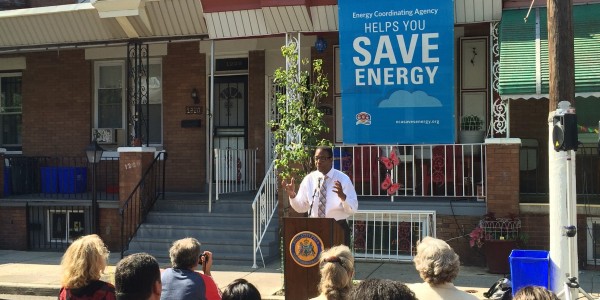Above: Philadelphia City Council President Darrell Clarke speaks at the celebration of Energy FIT Philly program’s rehab of homes on Seltzer Street in North Philadelphia on August 12, 2015. Energy FIT Philly is a program of the Energy Coordinating Agency (ECA). Photo: PHL Council Staff
Philadelphia, Aug. 12, 2015 – City Council President Darrell L. Clarke (5th District) on Wednesday joined North Philadelphia residents to celebrate the ongoing progress of the Energy Coordinating Agency’s (ECA) EnergyFIT program, which preserves housing in order to prevent displacement and homelessness among low-income residents.
EnergyFIT Philly has already completed energy upgrades and repairs to 30 homes in Mantua, which were selected after residents submitted an essay and application to the citywide “Coolest Block Contest.” Residents on the 1200 block of West Seltzer Street were selected in another citywide contest, and were happy to show off improvements that are already being made on their homes.
“Housing preservation is an important component of our overall strategy of encouraging equitable growth throughout the City and ensuring that every neighborhood is a community of choice,” Council President Clarke said. “The EnergyFIT Philly program is proving that it’s possible to maintain and preserve the character of a ‘row home city’ in an economically efficient and environmentally friendly way. Congratulations to the residents for working hard to improve their community. The only way Philadelphia achieves a more prosperous and equitable future is if our residents, government, and private and nonprofit partners keep working for it, together.”
“ECA has designed the Energy FIT Philly program as an innovative solution to the growing problem of housing deterioration in low-income neighborhoods. New technologies and methods are making it possible for us to double the energy savings, and provide durable, healthy, and affordable homes.” stated Liz Robinson, Executive Director of the Energy Coordinating Agency. “The neighbors on this block of Seltzer Street have been wonderful to work with.”
“Every Philadelphian deserves an opportunity to live on a block they can be proud of,” said Darlene Pope, a West Seltzer block captain. “My neighbors and I have been doing our part to make this block a great place to live for years. Thanks to the EnergyFIT Philly partnership, we will save on energy costs and be able to stay in our homes for as long as we choose.”
Due to state and federal funding cuts, home repair programs have not kept pace with the large stock of long-occupied, aging homes in Philadelphia. EnergyFIT Philly provides home repair and energy savings improvements to primarily low-income owner-occupied homes that are in such poor condition they do not qualify for most weatherization programs. Qualifying homes, selected in citywide contests, are subjected to energy audits and fitted with data loggers that monitor levels of moisture, a major contributor to home deterioration.
There are 331,000 row homes in Philadelphia, 38 percent of which are owned by low-income people – a high percentage relative to other major cities. Many of these homes are poorly maintained and not energy efficient, leading to utility costs of 25 percent to 40 percent of monthly income.
The Energy Coordinating Agency developed EnergyFIT Philly to preserve and stabilize low-income homes that, because of structural defects such as leaky roofs or basements, do not quality for home weatherization programs. Homes that have been improved by EnergyFIT receive some combination of new roofs, masonry repair, electrical, plumbing, carpentry, dry wall and related repairs. All homes receive extensive energy efficiency improvements, including air sealing, insulation, heating system repair or replacement, duct sealing, white roof coating, programmable thermostats, self-help education and other treatments.
The total projected energy savings from these improvements range from 25 percent to 50 percent per household, or an annual savings of between $250 and $500 per household. The EnergyFIT Philly program is largely funded by the Oak Foundation and the City of Philadelphia’s Housing Trust Fund, with support from the Commonwealth of Pennsylvania and area utilities.
“It is time for the City of Philadelphia to reinvest in struggling neighborhoods, including by supporting preservation programs,” Council President Clarke added. “The unique and diverse character of our neighborhoods is what makes Philadelphia a great place to live, work, and visit. Let’s work together to move our city forward while honoring our rich history.”






